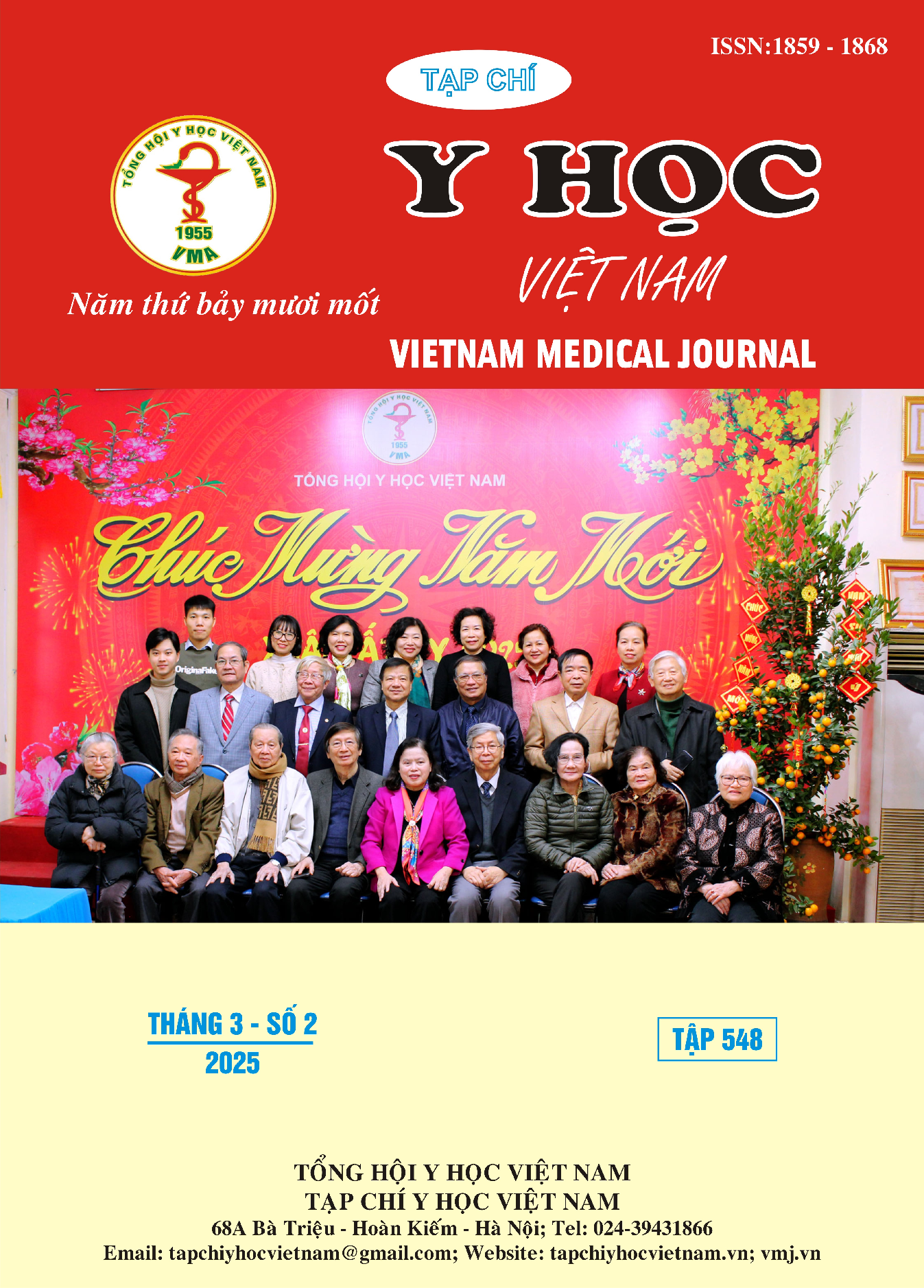PRELIMINARY RESULTS AND RELATED FACTORS OF NEOADJUVANT CHEMOTHERAPY WITH THE PACLITAXEL-CARBOPLATIN REGIMEN IN STAGE IIIC AND IV OVARIAN EPITHELIAL CANCER AT K HOSPITAL
Main Article Content
Abstract
Background: Advanced-stage ovarian cancer (stages IIIC and IV) is often characterized by poor prognosis and significant progression, making initial surgery challenging. Neoadjuvant chemotherapy with the paclitaxel-carboplatin regimen has been shown to reduce tumor size, facilitating more effective surgery, potentially extending survival, and reducing intraoperative and postoperative complications. Subjects and Methods: A retrospective descriptive study included 52 ovarian cancer patients who received neoadjuvant treatment with the paclitaxel-carboplatin regimen at K Hospital from January 2017 to January 2023. Results: The average patient age was 55.3 ± 8.9. The most common presenting symptom was "abdominal pain and distention," seen in 80.7% of cases. Most patients had tumor sizes > 5 cm (86.5%), with stage IIIC cases accounting for 71.2%. The highest incidence subtype was serous adenocarcinoma (78.8%). The most common metastatic sites were retroperitoneal lymph nodes (25%), pleura (13.5%), and liver (13.5%). The majority of patients received > 90% of the standard chemotherapy dose (84.6%). Clinical response rates reached 100% after 3 cycles. Factors influencing treatment response were identified as chemotherapy dose, disease stage, and pleural effusion status. The most frequent adverse effects were hematologic, particularly leukopenia (45.2%), primarily grade I-II. Conclusion: The study demonstrates that neoadjuvant chemotherapy with the paclitaxel-carboplatin regimen improves response rates and extends survival in patients with stage IIIC and IV ovarian epithelial cancer. The findings also suggest an important role of neoadjuvant chemotherapy for certain groups of patients.
Article Details
Keywords
ovarian cancer, neoadjuvant therapy, paclitaxel-carboplatin
References
2. Wright AA, Bohlke K, Armstrong DK, et al. Neoadjuvant chemotherapy for newly diagnosed, advanced ovarian cancer: Society of Gynecologic Oncology and American Society of Clinical Oncology Clinical Practice Guideline. Gynecol Oncol. 2016;143(1):3-15.
3. You B, Purdy C, Copeland LJ, et al. Identification of Patients With Ovarian Cancer Experiencing the Highest Benefit From Bevacizumab in the First-Line Setting on the Basis of Their Tumor-Intrinsic Chemosensitivity (KELIM): The GOG-0218 Validation Study. J Clin Oncol. 2022;40(34):3965-3974.
4. Trần Ngọc Dũng, Nguyễn Thùy Linh và cộng sự (2021). Nghiên cứu đặc điểm lâm sàng và cận lâm sàng bệnh nhân ung thư biểu mô buồng trứng típ thanh dịch. Tạp Chí Y học Quân sự, (352), 45–49
5. Châu Khắc Tú, Lê Sỹ Phương, Lê Minh Toàn và cộng sự (2017). Ứng dụng phẫu thuật nội soi trong điều trị ung thư buồng trứng giai đoạn muộn sau hóa trị liệu tân bổ trợ. Tạp Chí Phụ sản, 16(2), 74 - 78.
6. Nguyễn Thị Thanh Loan và cộng sự (2023). Đánh giá kết quả hóa trị tân bổ trợ phác đồ paclitaxel – carboplatin trong ung thư buồng trứng giai đoạn III-IV tại Bệnh viện K. Tạp chí Y học Việt Nam, (530),166-170.
7. Du Bois A, Weber B, Rochon J, et al. Addition of epirubicin as a third drug to carboplatin-paclitaxel in first-line treatment of advanced ovarian cancer: a prospectively randomized gynecologic cancer intergroup trial by the Arbeitsgemeinschaft Gynaekologische Onkologie Ovarian Cancer Study Group and the Groupe d’Investigateurs Nationaux pour l’Etude des Cancers Ovariens. J Clin Oncol. 2006;24(7):1127-1135.
8. Vasey PA, Jayson GC, Gordon A, et al. Phase III randomized trial of docetaxel-carboplatin versus paclitaxel-carboplatin as first-line chemotherapy for ovarian carcinoma. J Natl Cancer Inst. 2004;96(22):1682-1691.


